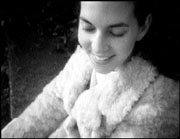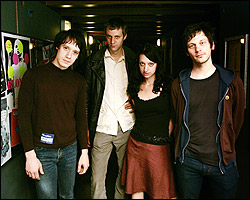ROSIE THOMAS, ROCKY VOTOLATO
Crocodile Cafe, 441-5611, $7 9 p.m. Thurs., Jan. 24
MY SENIOR YEAR of high school, I was voted the girl with the best sense of humor. A picture of me with Pat Swapp appeared in the annual, the two comedians posed straight-faced and studious. I always thought it was funny—not “ha ha” funny, but stupid, ridiculous, strange funny. Apparently I had fooled them all into thinking that I was comical when really I was sad and more than a little afraid. This is something that Rosie Thomas understands. Hell, Rosie Thomas could write the book on contradictions like that one.
“I’ve always had these two parts of me that I’ve loved just the same,” says Rosie over coffee on an early winter morning.
The first part of Rosie is the funny part. Funny “ha ha” and funny strange. Prompted by one of her teachers at Cornish, Rosie found herself onstage at Amateur Night at Giggles. The idea seemed frightening, but being the kind of girl who feels she must do exactly the thing that she is frightened of, she gave it a shot. After that first haphazard performance, the owners invited her back. She bullied her way into an opening slot for stoner/deadpan wit Mitch Hedberg, and she hasn’t looked back. She now performs as a character called Sheila. Sheila seriously adores the movie Titanic, she delivers pizza for a living and finds that fulfilling. She sports a chronic neck brace, she’s dorky, and she is somehow comfortable in her awkward ill ease. She laughs at herself. So does Rosie, and so would you.
“I don’t want to be one of those people who can’t laugh at themselves,” she says.
But in listening to Rosie’s recently released Sub Pop debut, When We Were Small, it’s clear that, like every class clown in the history of class clowns, she sometimes laughs to keep from crying.
“I was just giving them a part of me,” says Rosie of her stand-up routine. “I can give them more. I give people a chance to laugh—at themselves or at me—and I give them music to affect them.”
The second, more affecting part of Rosie Thomas is rooted in sad folk songs like Joni Mitchell’s “A Case of You.” Songs like “Lover’s Cross” by Jim Croce, old Van Morrison, and just about anything by Simon and Garfunkel. Songs and feelings that, especially if you had one of those fathers who took his acoustic guitar out after dinner and sang sweet love songs on a old ratty couch, can stick with you forever.
“This record is for my family,” she says of her autobiographical debut. “It’s about growing up with the possibility to do what you love. I guess it’s about everything in my life up until this point. Everything is a trial, and if you can be OK with that, you can get through it.”
In the hour or so that I sit with her, even as she talks about those trials—being far from her home in Detroit, feeling isolated, feeling unsure—she is never far from a smile or a soft giggle. The two parts of her make her whole.
“They’re honest about themselves,” she says of the people she likes best, and I assume that group includes people like her good friend and frequent billmate and collaborator Damien Jurado—and I’m also pretty sure that in that group, she includes herself.








